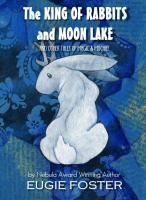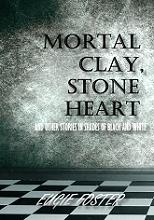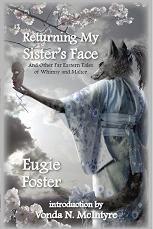Okay, my goal of writing a thousand words a day last week worked. I got out nearly 7000 words and am about one thousand away from being finished with the first draft of an urban fantasy tale with mainstream overtones. I’ve even got the ending figured out. I just need to tap out the climax scene and then wrap it up in a nice dénouement. But now, since I know what’s going to happen, it’s like tearing fingernails out with an eyebrow tweezers to get my muse to perform.
Argh!
And I’m also a little taken aback at how long this story turned out being. My current “real” word count is 6800 words–1000 for each day, just about. But in manuscript math, that’s closer to 8000 words and by the time it’s done, it will be solidly and inescapably a novelette. I can always fudge the numbers a smidgen on the cover page, but a novelette is a lot harder to sell than a short story. And that’s also inhibiting me. I’m in a “if I add more words to it, it’ll be longer, which is bad” state of mind, and no matter how often I tell myself “if I don’t add more words, it won’t be finished” I can’t seem to shake it. I’m so frustrated.
New plan: coffee. We’ll see if my muse perks up with a deluge of caffeine through our veins. If that doesn’t work, it’s time to get out the thumbscrews.









What’s the crossover point to novellette?
According to the Hugo and Nebula folks:
Short Story – less than 7500 words
Novelette – between 7500 and 17,500 words
Novella – between 17,500 and 40,000 words
Novel – over 40,000 words.
Although most novels are much longer than 40K words. Last I heard (if I remember correctly, which I might not since I don’t pay as much attention to novel marketing), the average length for a first (published) novel was around 80-100K. YA “novels” however, tend to actually be novella lengths, if that makes any sense.
Really? I figured the short story cut-off was a lot higher than that.
That makes Wanted: One Hero a novelette, not a short story, since it’s about 8K. Huh. Maybe that’s why I can’t find many magazines willing to look at a story of that length…
Uh, Mousie-fangs, I hate to break it to you, but I just did a cut-and-paste of “Wanted: One Hero” and converted it to Courier New 12 point and double-spaced it. I didn’t reformat your paragraphs, so my calculations are still off, but:
Evil word processor count (which is not industry-standard for ms length calculations): 9100 words.
Rough estimate from industry-standard formulas: between 12,100 and 12,500 words.
That is definitely a novelette you got there. It’s not impossible, by any stretch, to sell a novelette (since there’s at least one in nearly every issue of Analog, Asimov’s, and F&SF). But it is much harder to sell longer works than short.
*Blinks*
Wha…? How’d that happen?!
You’re right, I just did a word-count on the original manuscript in MSWord. 9,107. Weird. I could have sworn it was 8K…
Okay, I’m going to ask an ig’nant question here. Since all of my publishing experience to date is in the RPG industry, I’m not as up on the fiction publishing info as I should be. Why does the word count change from MSWord to industry standards? I mean, number of words is number of words, right?
Dare I hope that you’re cutting-and-pasting it as a prelude to reading it, BTW? If so, please keep in mind that this is an older work. Anything you like is still part of my style, but anything you don’t I’ve changed by now. 😉
Word count juju
Why does the word count change from MSWord to industry standards?
It all boils down to the definition of what a “word” is.
To a word processor, a word is anything with space around it. “My dog Bo” is three words. “Antidisestablishmentarianism” is one. The publishing folks are concerned ’bout space though. That is, the space a story will take up when published. For that, the word processor’s count is inaccurate. Some words are long; some words are short. The publishing standard definition is that a word is six (6) characters including spaces. It’s another reason why manuscript standard font is Courier 12 point. Not ’cause it’s so very pretty, but ’cause it’s a mono-spaced font (and big).
Also, just FYI, industry standard manuscript format is with paragraphs indented, rather than set off with an extra space between each one, double spaced, with widows and orphans turned off, and one inch margins all around. (Sorry if this is redundant info, but wanted to cover all my basis.)
So: rough industry standard word count estimate = 250 words a page.
More accurate industry standard count: (# of characters in a line divided by six) * (# of lines in the story).
Dare I hope that you’re cutting-and-pasting it as a prelude to reading it, BTW?
Heh. It was my intention to do so, but I kinda got sidetracked. Aside from other critique obligations I’ve got, I’m also trying to finish the first draft of the current beastie I’m working on since I’m in the homestretch (and before my slut muse runs off with the plumber or otherwise vacates for a prolonged period of time). I’d like to give your tale a run through, but no promises.
Re: Word count juju
“I’d like to give your tale a run through, but no promises.”
That’s fine. You shouldn’t feel obligated in any way. I understand that there are other things you’ve gotta do, and anyway, as I’ve said, it’s an old story. I’d love to hear your opinions of it–especially since you’ve been published in the areas I might think of trying to market this–but I fully understand if you can’t. 🙂
I’d finish it first, then worry about the word count. The finishing-it-first part is the most important. Once you have a complete draft, you might be able to see some obvious cuts. Alternatively, you could find some points to expand. Either way, worrying about it now will only inhibit you. And who knows? Maybe you would find a market for the longer length.
I know. I know. But doing is a lot harder than knowing!
Although actually, I think my muse and I are on better terms with a hot cup of java between us. I do believe I might actually finish this baby yet.
I wonder how people wrote before coffee?
Opium?
Don’t forget absinthe!
Ah, the lovely taste of wormwood. Urgh. Seriously, the sugar-straining ritual is half the fun. Remember From Hell?
IMHO, you should take as many words as you need to tell the story properly. If you need to make cuts, your editor will be more than happy to make suggestions. On the other hand, you might find that it grows into a novel.
I will drop On Writing at your doorstep the next time I pass through Atlanta. During my latest trip to Athens, we got in ridiculously late on Saturday night, spent most of Sunday at a cabin on the Broad River, and returned to Huntsvegas at some absurdly early-morning hour. Argh.
In other news: Matthew’s health is improving, I hope?
Re: Don’t forget absinthe!
I second your “Urgh”.
I don’t think I’ve got a novel in me yet. I keep starting one and petering out at about chapter three. Sigh. Eventually I will write a novel, preferably many. But part of me still feels like I’m still really learning the craft and I can’t see the point in spending months and months (maybe years and years) on a single long work that, when I’m done, may be so full of errors and bad writing that it’s effectively unpublishable. It makes more sense to me to cut my teeth on shorter efforts that require less commitment.
Matthew’s got his first appointment with the neurosurgeon tomorrow. Actually, I think he’s getting worse. Some days he’s only barely ambulatory with the help of mega pain killers. It’s how we got through the play on Saturday. Some days are better than others though. Hopefully we’ll know more after we talk with the doctor-thing.
Re: Don't forget absinthe!
“It makes more sense to me to cut my teeth on shorter efforts that require less commitment.”
Going to respectfully disagree here. 🙂
I’m a firm believer in the notion that the only way to learn to write novels is to write novels. Not counting those I didn’t finish–and there are several–I’ve written seven since I began in my junior year of college. Of those seven, only the latter four are even vaguely what I’d consider potentially worthy of publication. The second and third might be salvageable with massive rewrites. The first, as much as I love the concept behind the main character, is crap.
But the end result is my more recent novels, which I firmly believe are publishable, if I could just find someone willing to give ’em a fair shot. (This isn’t just ego, although I’m sure that’s part of it. It’s also based on feedback from people who I trust to be honest with me.)
Don’t get me wrong, I’m not saying you should start a novel before you feel you’re ready. But once you’re willing to take the plunge, you should do it immediately. You can write short stories for the next 50 years, but as I’m sure you know, a novel’s a very different animal.
And I’m sorry to hear about Matthew. Wish him the best of luck for me.
Re: Don’t forget absinthe!
I’m a firm believer in the notion that the only way to learn to write novels is to write novels.
Maybe so, but right now, I’m just working on polishing the writing part, regardless of length. I’ve fixed a lot of “beginner writer” sorts of weaknesses in my writing via my short story efforts.
I’ve heard before that a lot of writers treat the short story markets as a training ground for novel writing. Personally, I like short stories as a medium, but I can also see where they’re coming from. Things like convoluted plotting aren’t really handled well in shorter lengths, but equally important story elements like character development, tight prose, fluid style, good pacing, and believable dialogue are.
I’m also more inclined to experiment in a short story. I don’t mind screwing up a chunk of 5000 words. But wasting 100,000 words on a failed concept gives me the willies.
Plus, some of my favorite authors like Ray Bradbury, Tanith Lee, and Harlan Ellison are short story/novelette writers.
Followed a long trail here
Eugie and Mouse, do you mind if I add you to my friends page? I’m quite interested in reading what others have to say who have actually been published. I’m a good writer with a good job as a writer, but I have to say that NASA’s technical safety records are somewhat unfulfilling in the strictly creative sense.
I’m also interested to hear what you have to say about this:
I have an absolute terror of writing fiction. I write essays and “moment” pieces, but the only fiction pieces I’ve started have been such horrific drivel that I gagged on them. Any suggestions aside from “force yourself to write xxxx words per day?” Thanks in advance . . .
Re: Followed a long trail here
Hi Lilly,
Always glad to make new friends. I’ve added you to my friends list.
Re: I have an absolute terror of writing fiction . . . but the only fiction pieces I’ve started have been such horrific drivel that I gagged on them. Any suggestions
I really do think that the best way to learn how to write is to write. The general sentiment is that a writer needs to write one million words before they start producing anything worthwhile.
But maybe you need a neutral party to help you identify the problems with your efforts as a jumping off point? Have you considered attending a writers workshop? I toyed with the idea of being a writer all my life and I’d written a few things off and on. But my progress had pretty much plateaued (at a really unpublishable level), until I attended the writers workshop taught by Ann Crispin at Dragon*Con 2000. It wasn’t so much that the workshop was that fantastic or enlightening or anything, but it brought things into focus. I suddenly understood what those glitches were that I’d been dissatisfied with in my writing. Once I got over the plateau, I was able to move forward and have been aggressively pursuing my writing endeavors since.
You might also consider joining a critique group, either live or online. I’m a member of two online groups. One of them is comprised of attendees of that Dragon*Con 2K workshop. The other one is Critters.org, a very large and well-run group. It’s really helped me to have an audience for my writing. Getting feedback from real readers (not just friends and relatives) has taught me a lot about what works for the average genre fiction reader and what doesn’t. Also, I’ve found that seeing the errors of other writers is one of the most effective ways of learning what not to do.
Re: Followed a long trail here
Great. I like the idea of joining a writers’ critique group, but 1- I would prefer to do it online and had no idea in which communities I would fit, and 2- The only “real live” group in my area is apparently secretive and cultlike. I’ve been invited a few times to attend; however, when I’ve arrived they’ve mysteriously “disappeared.” I’m relatively certain that this can be attributed to the generic writers’ neurosis.
Enough babbling; thanks for the pointers; I’ll go ahead and join critters, and you too shall join my friends’ page. GA? I’m in TX and originally from MS. Nice to meet you!